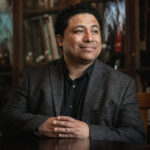poems about absent fathers
Poetry and Parenthood
Manuel Iris
I
Before we became parents, my wife and I lived in a two-bedroom apartment for a few years. One of the bedrooms was my office. It was the first time I had a physical space entirely devoted to my writing, to my readerly silence: mi casa en la casa. The significance of those four walls and their bookshelves went far beyond just being an ideal place to work: it was an expression of my identity, a visible extension of my obsessions.
In due course, this office was colonized by the presence, the still future presence, of my daughter. Among the bookshelves, there was now a crib and a rocker, along with other pieces of furniture and migrating items. Her books, likewise, took space among mine. The sanctuary no longer belonged to me alone.
I remember being scared: was it possible to write poetry while devoting one’s life to another human being? The happiness of those months was often mixed with the anxiety of this incessant question.
In reality, the problem was logistics: how to make time to write? To read? To do all the things that were part of my writer’s life during the first years of fatherhood? When and with what energy would I pick up my pen or plant myself in front of my keyboard?
It was enough, of course, to look at my women friends, poets who were also mothers, to realize there was no need to worry: they were able to both write and take care of their kids, albeit with tremendous effort. Watching them and reading them is proof you can commit to both things. And on top of that, they often do it without help. Other times, they still manage even when life itself is against them (I mean, society, the health system, the work system, their own families). My circumstances were much easier.
It dawned on me that my anxiety was not about my urge to write and do nothing else (that was never an option) but my desire to be a committed and loving father. To be there, to enjoy paternal loving and affection, and the voice of that little girl whose face I hadn’t yet seen. It’s not that I was asking myself when the writer would be able to be a father, but when, while enjoying fatherhood, would I be able to be a writer?
II
When I first saw my daughter’s face I was also able to make out another, beautiful and fragile face, the face of reality. As anticipated, my time and energy became scarce. Later, the many consecutive nights of sleeplessness had me dozing on the books I was attempting to read. Rewriting my drafts demanded a concentration that was physically impossible. On top of that, this new presence populated my mind and my field of vision: I spent hours gazing at those little hands without feeling the need to write, because now reality had become complete. I was happy, and it was very difficult to write in these conditions. So I devoted myself to experiencing those moments without a thought to anything else: my recently discovered love left me no other option.
But the poems came little by little, slowly but distinctly. My new life, which decided to have a siesta in what had once been my office, now inserted itself directly into my creative work. My love for my daughter, the fear of the world in which she lives, in which we all live, my fatherhood, became recurring themes in my poetry. The least of my concerns was my office: by then I had already been colonized on the inside. I say that with a smile on my face. It’s true that my time and energy had been considerably reduced, but the intense need to write about this love had become the driving force of my poetry. Writing had never been harder, but it also had never been more urgent.
Everything has its flipside.
III
As is usually the case when I write, I wanted to investigate the tradition that a creative impulse belongs to, or that it dialogues with. I wasn’t very surprised to see that the list of poets that talk about their fathering practiced with love was not very long. In literature, the father is almost always absent or abusive. There are so many examples, so varied and so canonical, that there’s no need to list them. The search for the father is practically a literary genre of its own. Killing the father is a common theme, one that can even be used for talking about our literary tradition itself. Poems to children are usually written after a family tragedy, or they have a tone of asking forgiveness, precisely for not having been a loving father.
I found many poems about loving one’s father that are laments over the death of one’s father. But these were written by the children, and I wasn’t searching for that, but for texts in which a father expresses love and tenderness. Examples were scarce, and writers of criticism almost never made a pitstop to cover these issues—loving fatherhood doesn’t seem to have much representation or literary prestige. Poets don’t tend to broach the topic, and the academy ignores it entirely. It would be worth it to ask why.
IV
Her name was Malva Marina Trinidad Reyes. She had hydrocephalus and died at the age of eight without having had the affection of her father, Pablo Neruda. The almost complete disappearance of her story is no coincidence—there isn’t a single public mention of Malva, a single poem about this child, who, due to the size of her fluid-filled head, the poet once called “a sort of semicolon” in a letter.
She was the sole descendent of the Nobel laureate, the child of his marriage to María Antonia “Maruca” Hagenaar. After eight years of illness, in which her mother survived all manner of humiliations, difficulties and financial hardship, Malva died in 1943, in Nazi-occupied Holland. Her father doesn’t mention her in his memoir, nor did he write a single poem about her. She didn’t have the same luck as the cat, the socks, a chestnut on the floor, or the conger chowder. . .
I’m not interested in passing moral judgment on Neruda or reviving the debate on the separation between an author and their work. What I do want is to think about the poet’s silence, and the terrible loss that this has meant for literature itself. A man who was capable writing beautifully about socks could have changed the poetic sensibility of the language itself if he had used his pen to talk about his daughter, about his daughter’s illness, about his love for her and the way this love occupied his heart, which was so full of other wars, conflicts and struggles. Neruda could have written the kind of poem that is still not very visible, and maybe used it to bring up a new topic in literature. But Malva, who was not a vital priority for him, also couldn’t be a poetic theme. It could have been the most original texts of all of Neruda’s work (and I believe that sincerely). But if I’m mistaken, if these hypothetical poems had been bad or corny, they still would have been more beautiful and less reprehensible than the “Ode to Stalin.”
But maybe it’s better to talk about what is really going on: Neruda’s silence about his fatherhood is an all too common story.
V
Being that it is such an oft repeated human experience, such a common occurrence, why does a loving fatherhood elude being written about? Or could it be that this is not the right question? Maybe we should ask if this silence betrays an absence in real life? Is it that writers haven’t felt an urgency to write about a reality that doesn’t concern them, or have they censored themselves because these subjects lack prestige? To put it another way: Is it that there is a lack of writing about fatherhood or is it that there is a lack of committed fathers to write about? The answer probably varies case by case, but the result is almost always the same: a textual absence, a lack.
If it’s true, as some people say, that in reality literature has few subjects that change in nuance over time, we might understand why certain issues, certain obsessions, get repeated so often in the work of individuals or nations. The great literary themes (death, time, self-transformation, etc.) refuse to disappear because they are an integral part of the human experience. But given its same ubiquity, you would think that raising children could be a form, a subgenre, of the so-called poetry of love, but that is not the case. The word love must be refashioned in the mouths of male authors. For some time now, female authors have been exploring the connection between literature and childrearing and critically revisiting the concept of motherhood. Isn’t it high time then for us male writers to embark on a similar search, to question our fatherhood and childrearing, and their role in the literature we write and consume?
VI
I am convinced that for too long, the patriarchy has blocked off affection from us men as a poetic possibility, and has given the word love a too predictable meaning. The vulnerability of a father who fears, of a man who loves without eroticism, doesn’t have much space or representation in or outside of poetry. In literature, in life, fatherhood is more a synonym for violence or absence than childrearing. Contemporary literature written by men gives more space to caring for nature than caring for one’s own children.
Nevertheless, talking about nature is still progress because it shows that new sensibilities and new literary themes are possible. The fatherhood that I am talking about will begin appearing in literary works because love exists, because it’s there, walking around my office and around the house of many other families where someone, a father or a mother, is a writer. More and more, I have witnessed parents, whether writers or not, devoting themselves lovingly to their children. However, in order for this reality to show up in poetry, we must lose the fear of vulnerability that comes with affection and caring for children. We need to redefine the word love, enrich it.
Every writer is free to write on any subject, and the conquest of affection is an expression of creative liberty that we should not put off any longer. We have the right to speak about, to feel, the love of childrearing. It would be worth it to fight for it as we sit across from the blank page. We need to reconquer the space we have ceded to violence, to redefine our identity, and along with that, our literature.
Translated by Slava Faybysh



